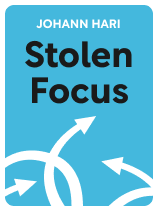

This article is an excerpt from the Shortform book guide to "Stolen Focus" by Johann Hari. Shortform has the world's best summaries and analyses of books you should be reading.
Like this article? Sign up for a free trial here .
What are the most memorable quotes from Stolen Focus? How can these quotes help you understand the attention crisis?
Stolen Focus explores Johann Hari’s evidence of an attention crisis, the seven factors causing this crisis, and his three-part solution. He also says can’t collectively confront the major challenges humanity faces because of the crisis.
Below we’ll look at three Stolen Focus quotes that explain his argument.
Stolen Focus Quotes
Hari holistically approaches the problem of focus. Many authors have written about the benefits of, for example, disconnecting from technology. But Hari makes a comprehensive diagnosis of society’s difficulty in concentrating, including everything from our food to the economy, and he proposes societal solutions rather than individual tips and tricks.
Let’s look at Stolen Focus quotes that address the attention crisis.
“The more novels you read, the better you were at reading other people’s emotions. It was a huge effect. This wasn’t just a sign that you were better educated—because reading nonfiction books, by contrast, had no effect on your empathy.”
Hari argues that reading—the most common flow experience—is disappearing from people’s lives. We engage less with the complex cognitive task of reading and, as a result, we are changing how we engage with complex topics.
Hari explains that as we read more from screens, we read less from the pages of books, and we ultimately become worse readers. He says more than half of the US population doesn’t read any books over a year. In Britain, so few people buy books that the market for printed novels shrank by 40% between 2008 and 2016.
In addition to pulling us away from books, reading on a screen affects how we interact with books and information when we do read, in three ways:
- The skimming and scanning we do on screens become our go-to reading strategy. This makes books less enjoyable because they’re not set up for skimming and scanning.
- We absorb and retain less information when we read on a screen, as opposed to on paper.
- Over time, we become less able to process long texts and complex information.
Hari argues that struggling to read and the attention crisis are mutually reinforcing. The more difficult it is to pay attention, the less we read books; the less we read books, the less we exercise the cognitive skills that help us pay attention.
“In situations of low stress and safety, mind-wandering will be a gift, a pleasure, a creative force. In situations of high stress or danger, mind-wandering will be a torment.”
Hari’s proof of the attention crisis is that we’re struggling to think. Our idea of concentration is being laser-focused on a specific task. However, our minds also need to wander purposefully to make connections and insights, which the constant distractions of modern life impede.
The brain performs three functions when your mind wanders:
- It has insights. While you allow your mind to wander, the brain unravels complex ideas, helping you understand them.
- It makes new connections. While your mind wanders, it makes new associations between ideas, which helps you find solutions to problems.
- It prepares you for the future. While the mind isn’t occupied with immediate concerns, it can consider future scenarios and prepare you for them.
“Not everything that is faced can be changed, but nothing can be changed until it is faced.”
According to Hari, our model of constant economic growth drives most of the factors contributing to the attention crisis. “Success” under the economic growth model requires companies to get larger and individuals to get richer. To grow, businesses continuously find ways to sell more products, which traps consumers in a pattern of doing more and buying more each year. Hari contends that the stress of a growth-oriented society undermines our ability to focus, and because it’s a societal problem, it requires societal solutions.
He argues that we could shift from constant growth to a steady-state economy. In this new model, we would define success by different values, such as having job security and enough time to pursue goals outside of work. This would require changing how society functions today, including the tech business model, and work and school schedules.

———End of Preview———
Like what you just read? Read the rest of the world's best book summary and analysis of Johann Hari's "Stolen Focus" at Shortform .
Here's what you'll find in our full Stolen Focus summary :
- The seven factors causing the current attention crisis
- Johann Hari's three-part solution to gaining your attention back
- Why society needs to change, not just individuals






